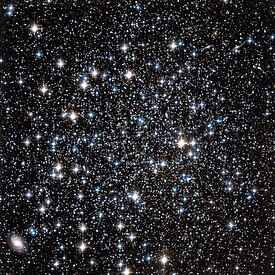NGC 5466
| NGC 5466 | |
|---|---|
 NGC 5466 by Hubble Space Telescope; 3.5′ view | |
| Observation data (J2000 epoch) | |
| Class | XII[1] |
| Constellation | Boötes |
| Right ascension | 14h 05m 27.29s[2] |
| Declination | +28° 32′ 04.0″[2] |
| Distance | 51.9 kly (15.9 kpc)[3] |
| Apparent magnitude (V) | 10.5 |
| Apparent dimensions (V) | 11 |
| Physical characteristics | |
| Mass | 1.79×105[4] M☉ |
| VHB | 16.47 |
| Metallicity | = –2.20[5] dex |
| Estimated age | 13.57 Gyr[5] |
| Other designations | C 1403+287, GCl 27, GC 3776, h 1746, H 6. |


NGC 5466 is a class XII globular cluster in the constellation Boötes. Located 51,800 light years from Earth and 52,800 light years from the Galactic Center, it was discovered by William Herschel on May 17, 1784, as H VI.9. This globular cluster is unusual insofar as it contains a certain blue horizontal branch of stars, as well as being unusually metal poor like ordinary globular clusters. It is thought to be the source of a stellar stream discovered in 2006, called the 45 Degree Tidal Stream. This star stream is an approximately 1.4° wide star lane extending from Boötes to Ursa Major.
See also[edit]
References[edit]
- ^ Shapley, Harlow; Sawyer, Helen B. (August 1927), "A Classification of Globular Clusters", Harvard College Observatory Bulletin, 849 (849): 11–14, Bibcode:1927BHarO.849...11S.
- ^ a b Goldsbury, Ryan; et al. (December 2010), "The ACS Survey of Galactic Globular Clusters. X. New Determinations of Centers for 65 Clusters", The Astronomical Journal, 140 (6): 1830–1837, arXiv:1008.2755, Bibcode:2010AJ....140.1830G, doi:10.1088/0004-6256/140/6/1830, S2CID 119183070.
- ^ Paust, Nathaniel E. Q.; et al. (February 2010), "The ACS Survey of Galactic Globular Clusters. VIII. Effects of Environment on Globular Cluster Global Mass Functions", The Astronomical Journal, 139 (2): 476–491, Bibcode:2010AJ....139..476P, doi:10.1088/0004-6256/139/2/476, hdl:2152/34371, S2CID 120965440.
- ^ Boyles, J.; et al. (November 2011), "Young Radio Pulsars in Galactic Globular Clusters", The Astrophysical Journal, 742 (1): 51, arXiv:1108.4402, Bibcode:2011ApJ...742...51B, doi:10.1088/0004-637X/742/1/51, S2CID 118649860.
- ^ a b Forbes, Duncan A.; Bridges, Terry (May 2010), "Accreted versus in situ Milky Way globular clusters", Monthly Notices of the Royal Astronomical Society, 404 (3): 1203–1214, arXiv:1001.4289, Bibcode:2010MNRAS.404.1203F, doi:10.1111/j.1365-2966.2010.16373.x, S2CID 51825384.
Further reading[edit]
- BROSCHE P.; GEFFERT M. (1983). "Membership of above horizontal branch stars in the globular cluster NGC 5466". Astronomy & Astrophysics. 127: 415–416. Bibcode:1983A&A...127..415B.[permanent dead link]
- BUONANNO R.; BUSCEMA G.; CORSI C.E.; IANNICOLA G.; et al. (1984). "Positions, magnitudes and colors for stars in the globular cluster NGC 5466". Astronomy & Astrophysics. 56: 79–86. Bibcode:1984A&AS...56...79B.[permanent dead link]
- ZINN R.; KING R. (1982). "The mass of the anomalous Cepheid in the globular cluster NGC 5466". The Astrophysical Journal. 262: 700–708. Bibcode:1982ApJ...262..700Z. doi:10.1086/160462.[permanent dead link]
- MONTGOMERY K.A.; HEASLEY J.N.; JANES K.A. (1994). "Photometry of globular cluster NGC 5466". Bull. Am. Astron. Soc. 26: 1490. Bibcode:1994AAS...18510410M.[permanent dead link]
- PRYOR C.; McCLURE R.D.; FLETCHER J.M.; HESSER J.E. (1991). "Mass-light ratios for globular clusters. II. The low-concentration clusters NGC 288, NGC 5466, and M 55 (NGC 6809)". The Astrophysical Journal. 102: 1026–1042. Bibcode:1991AJ....102.1026P. doi:10.1086/115929.[permanent dead link]
- BUONANNO R.; CORSI C.E.; FUSI PECCI F. (1985). "The giant, asymptotic and horizontal branches of globular clusters. II. Photographic of the metal-poor clusters M 15, M 92 and NGC 5466". Astronomy & Astrophysics. 145: 97–117. Bibcode:1985A&A...145...97B.[permanent dead link]
- MATEO M.; HARRIS H.C.; NEMEC J.; OLSZEWSKI E.W. (1990). "Blue stragglers as remnants of stellar mergers: the discovery of short-period eclipsing binaries in globular cluster NGC 5466". The Astrophysical Journal. 100: 469–484. Bibcode:1990AJ....100..469M. doi:10.1086/115530.[permanent dead link]
- BELOKUROV V.; EVANS N.W.; IRWIN M.J.; HEWETT P.C.; et al. (2006). "The discovery of tidal tails around the globular cluster NGC 5466". The Astrophysical Journal. 637 (1): L29–L32. arXiv:astro-ph/0511767. Bibcode:2006ApJ...637L..29B. doi:10.1086/500362. S2CID 125827556.
- FERRO A.A.; LOPEZ V.R.; GIRIDHAR S.; BRAMICH D.M. (2008). "CCD photometry of the globular cluster NGC 5466. RR Lyrae light-curve decomposition and the distance scale". Mon. Not. R. Astron. Soc. 384 (4): 1444–1458. arXiv:0711.4027. Bibcode:2008MNRAS.384.1444A. doi:10.1111/j.1365-2966.2007.12760.x. S2CID 17346022.
- McCARTHY J.K.; NEMEC J.M. (1997). "The chemical composition and period change rate of the anomalous cepheid V19 in NGC 5466". The Astrophysical Journal. 482 (1): 203–229. Bibcode:1997ApJ...482..203M. doi:10.1086/304118.
- LEHMANN I.; SCHOLZ R.-D. (1997). "Tidal radii of the globular clusters M 5, M 12, M 13, M 15, M 53, NGC 5053 and NGC 5466 from automated star counts". Astronomy & Astrophysics. 320: 776–782. Bibcode:1997A&A...320..776L.[permanent dead link]
- CORWIN T.M.; CARNEY B.W.; NIFONG B.G. (1999). "BV photometry of RR Lyrae variables in the globular cluster NGC 5466". The Astrophysical Journal. 118 (6): 2875–2887. Bibcode:1999AJ....118.2875C. doi:10.1086/301132.
- PEIKOV Z.I. (2002). "Logartithmic density range and the percentage of stars in the cores of various subsystems of the globular clusters M 56, M 12, NGC 6535, NGC 6171, NGC 5466, and M 92". Astronomy Reports. 46 (5): 352–359. Bibcode:2002ARep...46..352P. doi:10.1134/1.1479422. S2CID 119875718.[permanent dead link]
- JEON Y.-B.; LEE M.G.; KIM S.-L.; LEE H. (2004). "SX Phoenicis stars in the globular cluster NGC 5466". The Astronomical Journal. 128 (1): 287–299. arXiv:astro-ph/0404069. Bibcode:2004AJ....128..287J. doi:10.1086/421735. S2CID 17310076.
- ROJAS LOPEZ V.; ARELLANO FERRO A.; GIRIDHAR S.; BRAMICH D.M. (2006). "Physical parameters of RR Lyrae stars in the globular cluster NGC 5466: The Oosterhoff dichotomy". Rev. Mex. Astron. Astrofís. Ser. Conf. 26: 49. Bibcode:2006RMxAC..26...49R.[permanent dead link]
- GRILLMAIR C.J.; JOHNSON R. (2006). "The detection of a 45° tidal stream associated with the globular cluster NGC 5466". The Astrophysical Journal. 639 (1): L17–L20. arXiv:astro-ph/0602602. Bibcode:2006ApJ...639L..17G. doi:10.1086/501439. S2CID 17925570.
- Fekadu, Nassissie; Sandquist, Eric L.; Bolte, Michael (2007). "Photometry of the Globular Cluster NGC 5466: Red Giants and Blue Stragglers". The Astrophysical Journal. 663 (1): 277–295. arXiv:astro-ph/0602602. Bibcode:2007ApJ...663..277F. doi:10.1086/518637. S2CID 2600674.
External links[edit]
Wikimedia Commons has media related to NGC 5466.
- NGC 5466 on WikiSky: DSS2, SDSS, GALEX, IRAS, Hydrogen α, X-Ray, Astrophoto, Sky Map, Articles and images
- SIMBAD, NGC 5466 data
- VizieR, NGC 5466
- SEDS, NGC 5466
- Aladin, Image NGC 5466

![{\displaystyle {\begin{smallmatrix}\left[{\ce {Fe}}/{\ce {H}}\right]\end{smallmatrix}}}](https://wikimedia.org/api/rest_v1/media/math/render/svg/4c0821bd80891e071c08e7c7ee8e022baedf522c)